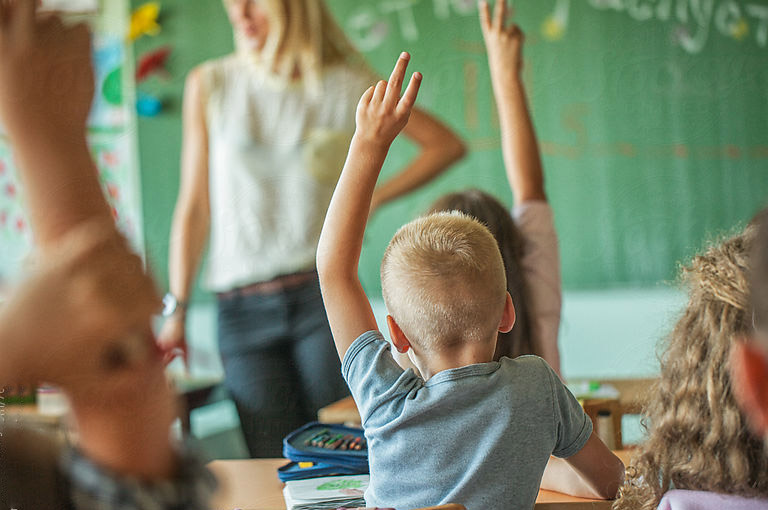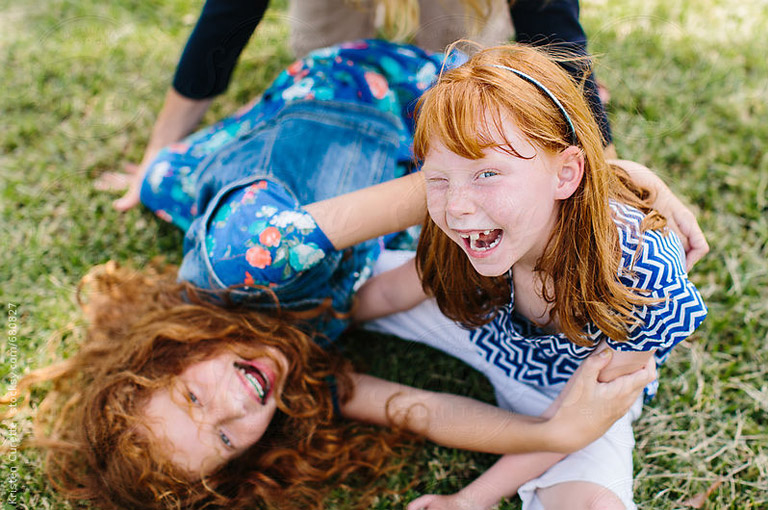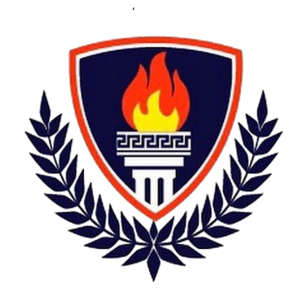Science
At Hewitt, our young scientists work collaboratively as they build resilience and perseverance through hands-on learning. Following their own questions and curiosity, our girls are continually engaged in collecting information, solving problems, applying creativity, and communicating what they learn in our lab and out in the field.
In the STEAM Lab, our young scientists are immersed in both the scientific method as well as in the engineering design process as they build on their prior knowledge, collect information, carry out investigations, and record data. To help increase stamina and engagement with the wonders of scientific exploration, design, and building, we give the girls opportunities to apply scientific and mathematical concepts to engineering challenges. For example, second graders pose as environmental engineers and construct a water filter to help them better understand the process of filtration. Hewitt faculty use an interdisciplinary approach to enable students to connect the dots to what they learned in other disciplines. For example, in their year-long investigation of the Hudson River, third graders assume the role of civil engineers and learn how to strengthen and reinforce bridges in the STEAM Lab while simultaneously recreating a model of the Hudson River in social studies. Such dedicated, purposeful moments of experiential learning enable the girls to broaden and deepen their knowledge as capable and confident scientists.
World Languages
As part of Hewitt’s commitment to educating girls as global citizens, students begin studying Spanish in kindergarten. By focusing on a second language at an early age, girls have time to absorb the sound of the language and begin to master basic vocabulary and grammar structures, preparing them for more intensive study in middle school. Lower school language classes are fun, creative, and action oriented, full of lively visual and audio documents. Lessons use gradual, spiral approaches to reinforce learning from one lesson to the next. Throughout the program, students focus on the incremental development of listening, reading, speaking, and writing skills, developing a good ear for the language and confidence in both oral and written communication.
Music
Music education is essential to Hewitt’s lower school program. Our girls sing, play instruments, and participate in movement activities that encourage kinesthetic learning. We base our music curriculum on the Orff-Schulwerk method (which focuses on percussion and movement) and the Kodály method (which uses a child-developmental approach to sequence). After the children become familiar with a new musical concept, they learn how to notate it. We also review concepts through games, movement, songs, and exercises.
The girls practice notation by playing a variety of instruments including percussives and wind instruments. By fourth grade, students hone unison singing and learn two-part and choral music. Students expand their musical vocabulary using terminology surrounding dynamics (i.e. crescendo, decrescendo, piano, forte, etc.) and tempo (i.e. ritardando, accelerando). Building on their recorder playing from third grade, fourth grade students learn notes that require forked fingering positions and larger interval leaps. We expose students to a wide range of musical genres through recordings and field trips to live performances around New York City, building a lifelong appreciation of diverse musical traditions.
Art
Our lower school art studio hums with constant energy, as girls across grades learn to take risks, problem solve, translate their ideas, take responsibility, practice a discipline, and make discriminating choices. Girls work with a variety of materials and ideas and come to trust their own creative process. Each girl discovers a personal haven in the art room where her individual talents are valued and celebrated.
Hewitt artists learn from the outset that there is a wide, diverse world of artistic expression in New York City, and they eagerly embrace its influences. By fourth grade, our artists explore personal ideas and experiences through various artistic media, including drawing, painting, mixed media, collage, wool, and sculpture. We emphasize effort, participation, originality of ideas, and the process of art making, and design art lessons to both increase skill level and to reflect the interests of the students, as the girls work toward demonstrating understanding of concepts, original thinking, and quality of craftsmanship.
Technology
We introduce technology in the lower school as an opportunity for girls to explore, experiment, and play, augmenting their learning experiences in class. Early exposure to iPads and Chromebooks helps enrich, reinforce, and extend each grade-level curriculum. Introduction to hands-on electronics, robotics, engineering, and programming challenges teaches girls how to process information, problem solve, troubleshoot, and communicate. Teachers work closely and sometimes co-teach with Hewitt’s educational technologist to design and implement technology-enhanced projects. Using Chromebooks, students formally begin typing using Keyboarding Without Tears and complete assignments using Google Apps for Education. Throughout the lower school program, students experience the engineering process of design by planning, building, testing, rebuilding, and retesting. They use age-appropriate technology to locate, collect, and organize content for a specific purpose. And our girls begin to learn about responsible uses of technology and digital information, and they perform basic searches on databases to locate accurate information.
Me, You, and We
Launched in 2018, our Me, You, and We program incorporates anti-bias education into our lower school curriculum. Inspired by the National Association for the Education of Young Children’s Anti-bias Education for Young Children and Ourselves program, Me, You, and We encourages students to explore the wide range of human diversity they see at school and in their extended communities while building a positive sense of self and developing caring human connections. Supported by deliberate and appropriately challenging discussion prompts, activities, and scenarios that encourage self reflection, lower school students learn to recognize unfairness and stereotypes, consider their own misconceptions, and stand up for what is right in the face of prejudice.
Each Me, You, and We lesson starts with a series of carefully considered questions for students to discuss as a classroom community. Over the course of the year these questions, which often tie into students’ social studies explorations, center around specific themes including culture and language, physical attributes and abilities, communities and class, and family structures and values. Through these topic-specific conversations, teachers are able to identify what students already know about their various social identities (e.g. ability, beliefs, culture, ethnicity, family composition, gender, language, race, religion, and socioeconomic class) and discern misinformation and knowledge gaps. Lower school teachers use classroom discussions, activities, and read-alouds to develop in-depth lessons that feel meaningful and personal to their students.
Physical Education
The lower school physical education program emphasizes the joy of movement while developing girls’ spatial awareness and balance. In addition, lessons focus on practicing the coordination necessary to perform various movements and activities related to team sports, such as running, throwing, and catching. Students practice these skills during class as individuals and in small groups, working cooperatively with classmates to achieve common goals while consistently demonstrating sportswomanship.
By fourth grade, our athletes are developing lifelong physical fitness attributes, movement skills, and sports concepts. We provide students ample opportunities to develop leadership skills and to work in small groups to solve problems or accomplish tasks. Through purposeful learning activities, we guide students to refine motor, social, and intellectual skills, and embrace a fit and active lifestyle. By the conclusion of lower school, Hewitt girls are well prepared, mentally and physically, to join our athletics program that begins in middle school.
Public Speaking
As an essential component of a Hewitt girl’s education, public speaking in the lower school cultivates confidence and clarity in presenting ideas. Writing workshop incorporates public speaking at each grade level by encouraging girls to read their work aloud and for an audience. During the third grade wax museum project, girls research a woman in an area of interest, from science to the arts to politics, and then give a speech from the point of view of that inspirational figure. In fourth grade, students perform in an interdisciplinary musical theater program that is connected to their role as lower school leaders. And in every grade in lower school, we encourage girls to practice presenting their ideas to their peers and teachers in all subjects, so that speaking in public becomes a familiar and comfortable pursuit.
Library Program
We celebrate independent reading in every grade as a complement to our reading workshop. Teachers instill a deep appreciation for reading and for “choice books.” The library program strives to develop students’ personal interests through guided exposure to the library’s collection, where students enjoy a wide variety of print and electronic resources. The library provides another opportunity for girls to listen to stories and discuss them together during surveys of favorite authors and illustrators. In later grades, we emphasize research skills and introduce girls to new library resources, including appropriate online resources.
Learning Support Team
The learning support team, composed of our learning specialist, lower school psychologist, curriculum coordinator, literacy specialist, and math specialist, work closely with homeroom teachers to provide support and enrichment to ensure that every girl is working at the high edge of her ability. Specialists join classroom lessons when appropriate to work directly with students, and they make recommendations to teachers on differentiated instruction to best address the learning goals of all girls in a classroom. In addition, our learning resource team works with parents to develop learning plans for specific students and serves on the lower school’s child study committee.
After-School and Summer Enrichment Programs
Hewitt After School offers specialty classes for students in kindergarten through grade 8. We carefully design each class to enrich students’ overall experiences in the performing arts, STEM, academics, and physical education. We offer classes on a semester basis, allowing lower and middle school students to immerse themselves deeply in experiential learning around their personal interests. Classes include Art Show, Chess, Broadway Stars, Mandarin, Guitar, Prima Ballet, STEM Stars, Multi-Sports, and Making Movies. Students also have the option to sign up for Hewitt Club, where they can do homework, play games, create arts and crafts projects, or enjoy a good book.
Hewitt Summer Camp is a dynamic extension of our academic schedule. Campers join us for exciting week-long pursuits in STEM, personal finance, culinary science, tennis, creative writing, and the performing arts. Our programs feature hands-on learning, themed workshops, field trips, and the opportunity to learn from current Hewitt faculty as well as fantastic instructors from across New York City. Students participating in Hewitt Summer Camp build meaningful relationships with other campers, make new friends from different grades, and explore new areas of interest.
Service Learning and Community Purpose
Hewitt’s lower school service learning program brings the school and local community together in partnership to share resources, meet real community needs, and educate our young girls to become the change agents of tomorrow. Service learning projects are developed in concert with our lower school curriculum and give students the opportunity to investigate issues and areas of interest that are personally meaningful to them.





